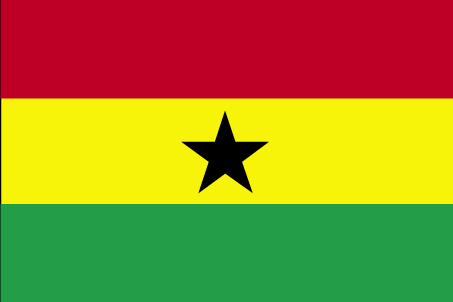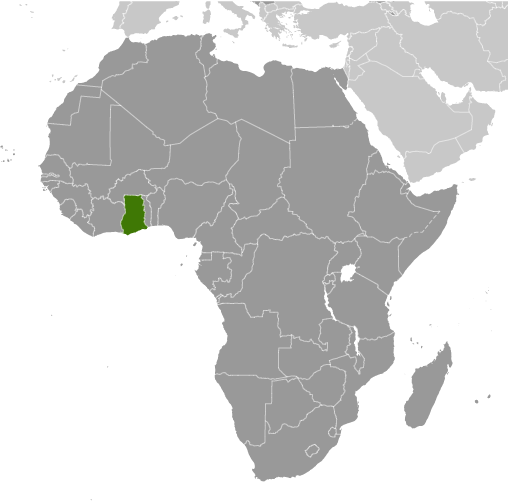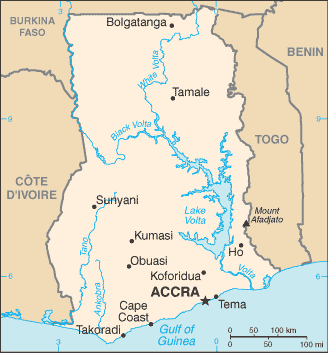Formed from the merger of the British colony of the Gold Coast and the Togoland trust territory, Ghana in 1957 became the first sub-Saharan country in colonial Africa to gain its independence. Ghana endured a long series of coups before Lt. Jerry RAWLINGS took power in 1981 and banned political parties. After approving a new constitution and restoring multiparty politics in 1992, RAWLINGS won presidential elections in 1992 and 1996, but was constitutionally prevented from running for a third term in 2000. John KUFUOR succeeded him and was reelected in 2004. John Atta MILLS took over as head of state in early 2009.
Population
24,339,838
Country comparison to the world:47
note: estimates for this country explicitly take into account the effects of excess mortality due to AIDS; this can result in lower life expectancy, higher infant mortality, higher death rates, lower population growth rates, and changes in the distribution of population by age and sex than would otherwise be expected (July 2010 est.)
Nationality
Noun:Ghanaian(s)
Adjective:Ghanaian
Ethnic groups
Akan 45.3%, Mole-Dagbon 15.2%, Ewe 11.7%, Ga-Dangme 7.3%, Guan 4%, Gurma 3.6%, Grusi 2.6%, Mande-Busanga 1%, other tribes 1.4%, other 7.8% (2000 census)
Religions
Christian 68.8% (Pentecostal/Charismatic 24.1%, Protestant 18.6%, Catholic 15.1%, other 11%), Muslim 15.9%, traditional 8.5%, other 0.7%, none 6.1% (2000 census)
Languages
Asante 14.8%, Ewe 12.7%, Fante 9.9%, Boron (Brong) 4.6%, Dagomba 4.3%, Dangme 4.3%, Dagarte (Dagaba) 3.7%, Akyem 3.4%, Ga 3.4%, Akuapem 2.9%, other 36.1% (includes English (official)) (2000 census)
Country Name
Conventional long form: Republic of Ghana
Conventional short form: Ghana
Former:Gold Coast
Government Type
constitutional democracy
Capital
Name:Accra
Geographic coordinates:5 33 N, 0 13 W
Time difference:UTC 0 (5 hours ahead of Washington, DC during Standard Time)
Administrative divisions
10 regions; Ashanti, Brong-Ahafo, Central, Eastern, Greater Accra, Northern, Upper East, Upper West, Volta, Western
Independence
6 March 1957 (from the UK)
National Holiday
Independence Day, 6 March (1957)
Constitution
approved 28 April 1992
Legal system
based on English common law and customary law; has not accepted compulsory ICJ jurisdiction
Suffrage
18 years of age; universal
Executive branch
Chief of state:President John Evans Atta MILLS (since 7 January 2009); Vice President John Dramani MAHAMA (since 7 January 2009); note - the president is both the chief of state and head of government
Head of government:President John Evans Atta MILLS (since 7 January 2009); Vice President John Dramani MAHAMA (since 7 January 2009)
Cabinet:Council of Ministers; president nominates members subject to approval by Parliament
(For more information visit the World Leaders website)
Elections:president and vice president elected on the same ticket by popular vote for four-year terms (eligible for a second term); election last held on 7 and 28 December 2008 (next to be held on 7 December 2012)
Election results:John Evans Atta MILLS elected president in run-off election; percent of vote - John Evans Atta MILLS 50.23%, Nana Addo Dankwa AKUFO-ADDO 49.77%
Legislative branch
unicameral Parliament (230 seats; members elected by direct, popular vote to serve four-year terms)
Elections:last held on 7 December 2008 (next to be held on 7 December 2012)
Election results:percent of vote by party - NA; seats by party - NDC 114, NPP 107, PNC 2, CPP 1, independent 4, other 2
Judicial branch
Supreme Court
Political Parties and Leaders
Convention People's Party or CPP [Ladi NYLANDER]; Democratic Freedom Party or DFP [Alhaji Abudu Rahman ISSAKAH]; Every Ghanaian Living Everywhere or EGLE; Great Consolidated Popular Party or GCPP [Dan LARTEY]; National Democratic Congress or NDC [Dr. Kwabena ADJEI]; New Patriotic Party or NPP [Peter MAC-MANU]; People's National Convention or PNC [Alhaji Amed RAMADAN]; Reform Party [Kyeretwie OPUKU]; United Renaissance Party or URP [Charles WAYO]
Political pressure groups and leaders
Christian Aid (water rights); Committee for Joint Action or CJA (education reform); National Coalition Against the Privatization of Water or CAP (water rights); Oxfam (water rights); Public Citizen (water rights); Students Coalition Against EPA [Kwabena Ososukene OKAI] (education reform); Third World Network (education reform)
International organization participation
ACP, AfDB, AU, C, ECOWAS, FAO, G-24, G-77, IAEA, IBRD, ICAO, ICC, ICCt, ICRM, IDA, IFAD, IFC, IFRCS, ILO, IMF, IMO, IMSO, Interpol, IOC, IOM, IPU, ISO, ITSO, ITU, ITUC, MIGA, MINURCAT, MINURSO, MONUC, NAM, OAS (observer), OIF (associate member), OPCW, UN, UNAMID, UNCTAD, UNESCO, UNHCR, UNIDO, UNIFIL, UNITAR, UNMIL, UNOCI, UNWTO, UPU, WCO, WFTU, WHO, WIPO, WMO, WTO
Diplomatic representation in the US
Chief of mission:Ambassador Daniel Ohene AGYEKUM
Chancery: 3512 International Drive NW, Washington, DC 20008
Telephone:[1] (202) 686-4520
FAX:[1] (202) 686-4527
Consulate(s) general:New York
Diplomatic representation from the US
Chief of mission:Ambassador Donald G. TEITELBAUM
Embassy:24 4th Circular Rd. Cantonments, Accra
Mailing address:P. O. Box 194, Accra
Telephone:[233] (21) 741-000
FAX:[233] (21) 741-389
Flag description
three equal horizontal bands of red (top), yellow, and green, with a large black five-pointed star centered in the yellow band; red symbolizes the blood shed for independence, yellow represents the country's mineral wealth, while green stands for its forests and natural wealth; the black star is said to be the lodestar of African freedom
note: uses the popular Pan-African colors of Ethiopia; similar to the flag of Bolivia, which has a coat of arms centered in the yellow band










